Transition to Professional Nursing Practice: Skills and Understanding
VerifiedAdded on 2023/06/10
|5
|1154
|163
Essay
AI Summary
This essay outlines the essential skills and understanding required for a successful transition to professional nursing practice. It highlights the importance of interpersonal, verbal, and written communication skills, clinical knowledge and problem-solving abilities, and the ability to work within a team. The essay also emphasizes understanding the professional, ethical, and legal requirements of a Registered Nurse, the role of continuous improvement, quality, and safety, and a demonstrated understanding of NSW Health's CORE Values (Collaboration, Openness, Respect, and Empowerment). The student demonstrates their understanding through examples from their academic and practical experiences, showcasing their readiness for a professional nursing career. Desklib provides access to similar solved assignments and study resources for students.
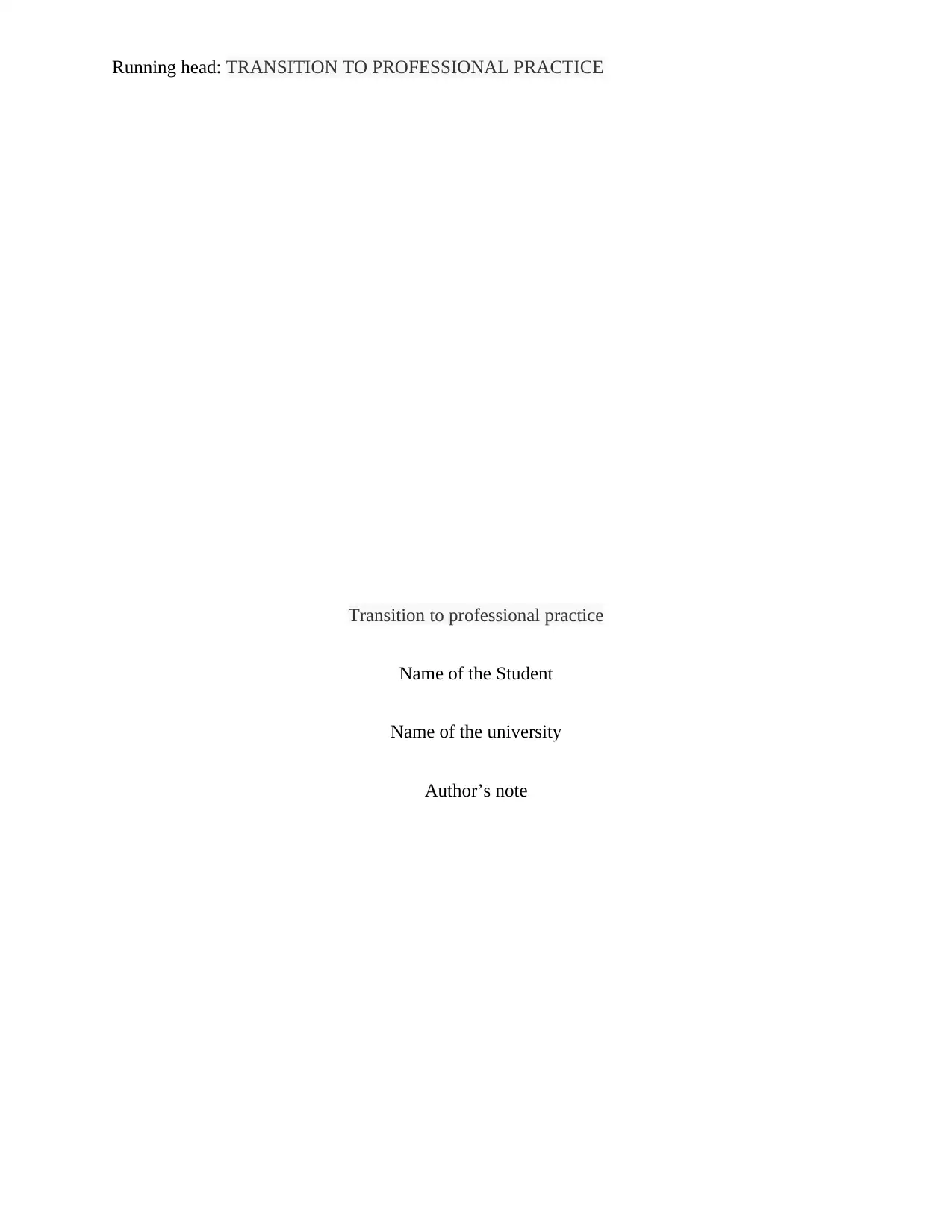
Running head: TRANSITION TO PROFESSIONAL PRACTICE
Transition to professional practice
Name of the Student
Name of the university
Author’s note
Transition to professional practice
Name of the Student
Name of the university
Author’s note
Paraphrase This Document
Need a fresh take? Get an instant paraphrase of this document with our AI Paraphraser
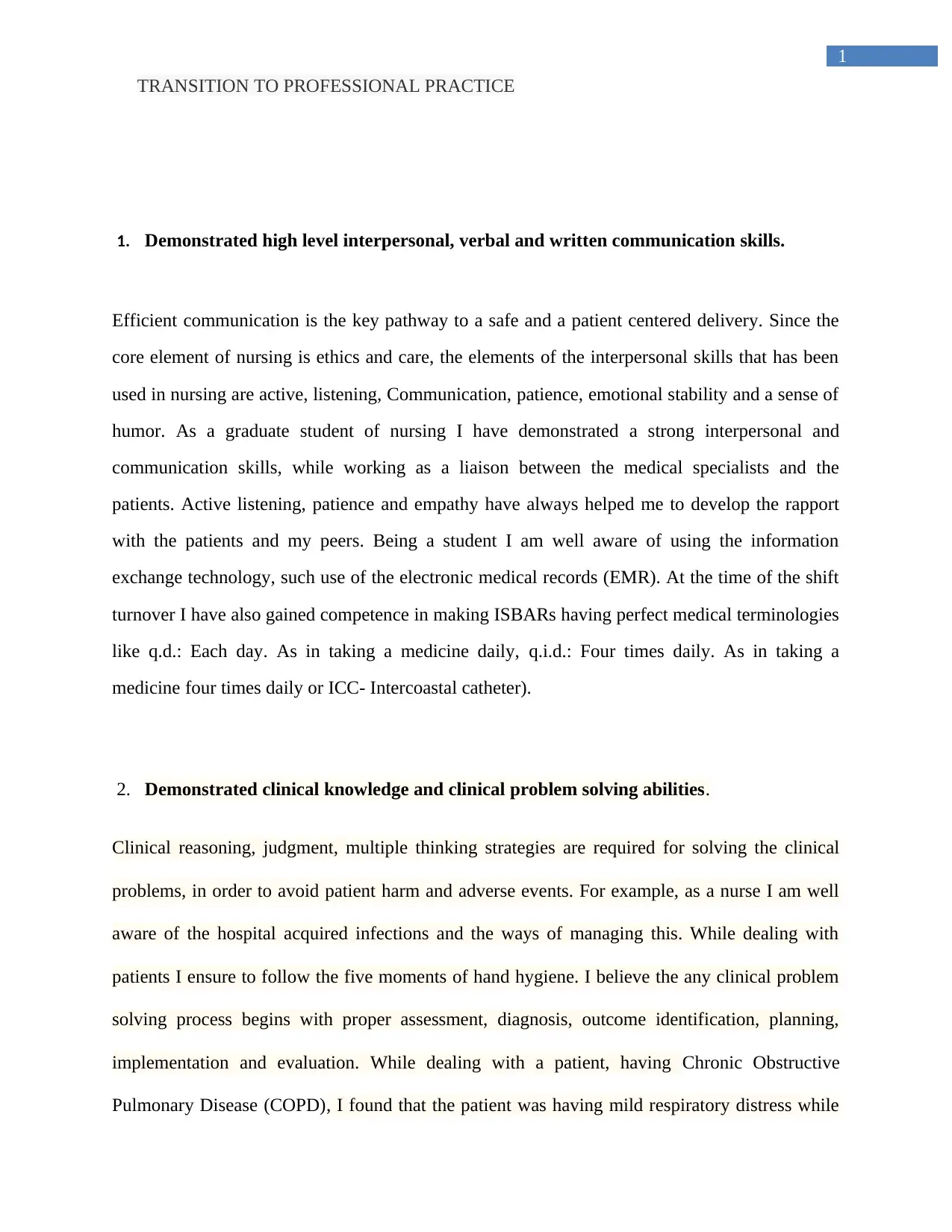
1
TRANSITION TO PROFESSIONAL PRACTICE
1. Demonstrated high level interpersonal, verbal and written communication skills.
Efficient communication is the key pathway to a safe and a patient centered delivery. Since the
core element of nursing is ethics and care, the elements of the interpersonal skills that has been
used in nursing are active, listening, Communication, patience, emotional stability and a sense of
humor. As a graduate student of nursing I have demonstrated a strong interpersonal and
communication skills, while working as a liaison between the medical specialists and the
patients. Active listening, patience and empathy have always helped me to develop the rapport
with the patients and my peers. Being a student I am well aware of using the information
exchange technology, such use of the electronic medical records (EMR). At the time of the shift
turnover I have also gained competence in making ISBARs having perfect medical terminologies
like q.d.: Each day. As in taking a medicine daily, q.i.d.: Four times daily. As in taking a
medicine four times daily or ICC- Intercoastal catheter).
2. Demonstrated clinical knowledge and clinical problem solving abilities.
Clinical reasoning, judgment, multiple thinking strategies are required for solving the clinical
problems, in order to avoid patient harm and adverse events. For example, as a nurse I am well
aware of the hospital acquired infections and the ways of managing this. While dealing with
patients I ensure to follow the five moments of hand hygiene. I believe the any clinical problem
solving process begins with proper assessment, diagnosis, outcome identification, planning,
implementation and evaluation. While dealing with a patient, having Chronic Obstructive
Pulmonary Disease (COPD), I found that the patient was having mild respiratory distress while
TRANSITION TO PROFESSIONAL PRACTICE
1. Demonstrated high level interpersonal, verbal and written communication skills.
Efficient communication is the key pathway to a safe and a patient centered delivery. Since the
core element of nursing is ethics and care, the elements of the interpersonal skills that has been
used in nursing are active, listening, Communication, patience, emotional stability and a sense of
humor. As a graduate student of nursing I have demonstrated a strong interpersonal and
communication skills, while working as a liaison between the medical specialists and the
patients. Active listening, patience and empathy have always helped me to develop the rapport
with the patients and my peers. Being a student I am well aware of using the information
exchange technology, such use of the electronic medical records (EMR). At the time of the shift
turnover I have also gained competence in making ISBARs having perfect medical terminologies
like q.d.: Each day. As in taking a medicine daily, q.i.d.: Four times daily. As in taking a
medicine four times daily or ICC- Intercoastal catheter).
2. Demonstrated clinical knowledge and clinical problem solving abilities.
Clinical reasoning, judgment, multiple thinking strategies are required for solving the clinical
problems, in order to avoid patient harm and adverse events. For example, as a nurse I am well
aware of the hospital acquired infections and the ways of managing this. While dealing with
patients I ensure to follow the five moments of hand hygiene. I believe the any clinical problem
solving process begins with proper assessment, diagnosis, outcome identification, planning,
implementation and evaluation. While dealing with a patient, having Chronic Obstructive
Pulmonary Disease (COPD), I found that the patient was having mild respiratory distress while
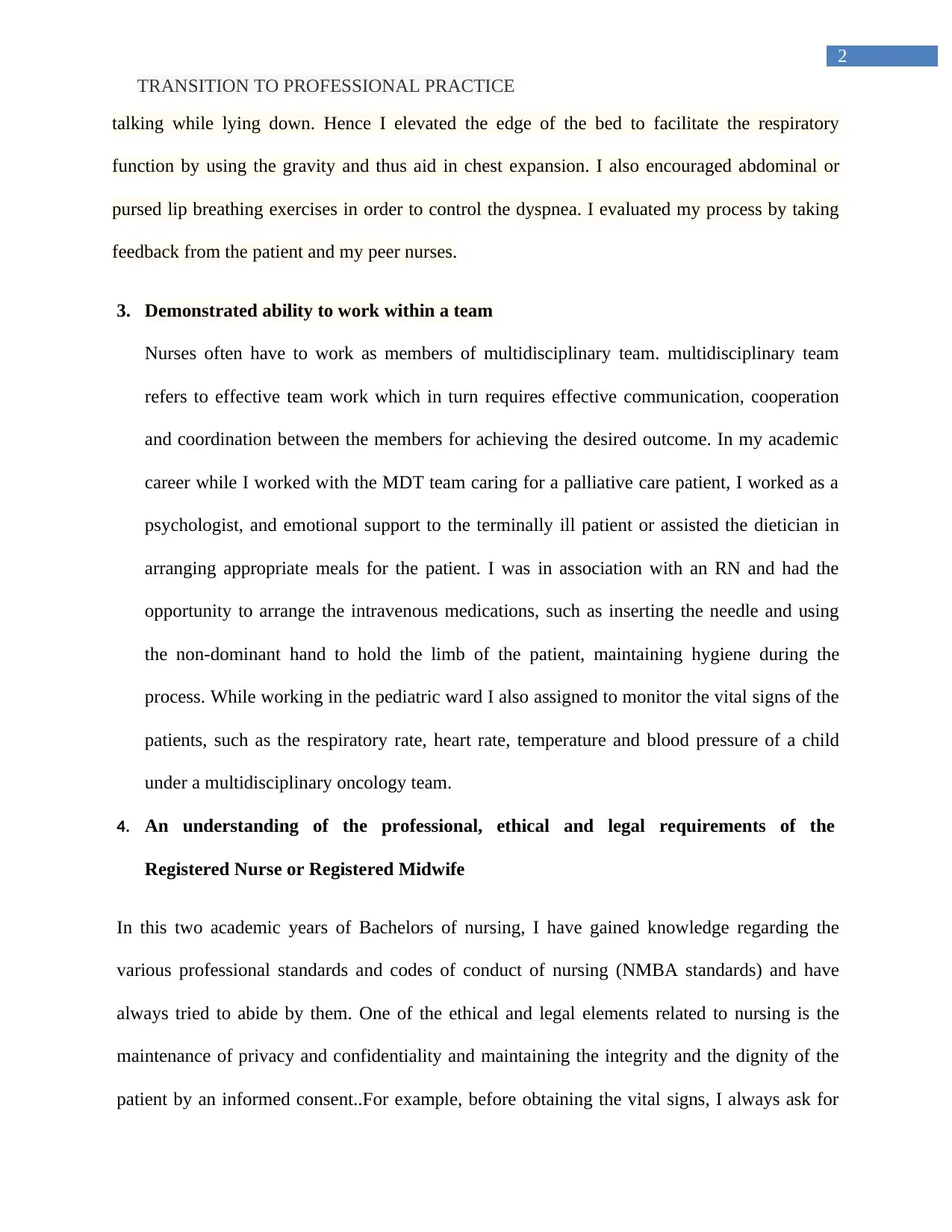
2
TRANSITION TO PROFESSIONAL PRACTICE
talking while lying down. Hence I elevated the edge of the bed to facilitate the respiratory
function by using the gravity and thus aid in chest expansion. I also encouraged abdominal or
pursed lip breathing exercises in order to control the dyspnea. I evaluated my process by taking
feedback from the patient and my peer nurses.
3. Demonstrated ability to work within a team
Nurses often have to work as members of multidisciplinary team. multidisciplinary team
refers to effective team work which in turn requires effective communication, cooperation
and coordination between the members for achieving the desired outcome. In my academic
career while I worked with the MDT team caring for a palliative care patient, I worked as a
psychologist, and emotional support to the terminally ill patient or assisted the dietician in
arranging appropriate meals for the patient. I was in association with an RN and had the
opportunity to arrange the intravenous medications, such as inserting the needle and using
the non-dominant hand to hold the limb of the patient, maintaining hygiene during the
process. While working in the pediatric ward I also assigned to monitor the vital signs of the
patients, such as the respiratory rate, heart rate, temperature and blood pressure of a child
under a multidisciplinary oncology team.
4. An understanding of the professional, ethical and legal requirements of the
Registered Nurse or Registered Midwife
In this two academic years of Bachelors of nursing, I have gained knowledge regarding the
various professional standards and codes of conduct of nursing (NMBA standards) and have
always tried to abide by them. One of the ethical and legal elements related to nursing is the
maintenance of privacy and confidentiality and maintaining the integrity and the dignity of the
patient by an informed consent..For example, before obtaining the vital signs, I always ask for
TRANSITION TO PROFESSIONAL PRACTICE
talking while lying down. Hence I elevated the edge of the bed to facilitate the respiratory
function by using the gravity and thus aid in chest expansion. I also encouraged abdominal or
pursed lip breathing exercises in order to control the dyspnea. I evaluated my process by taking
feedback from the patient and my peer nurses.
3. Demonstrated ability to work within a team
Nurses often have to work as members of multidisciplinary team. multidisciplinary team
refers to effective team work which in turn requires effective communication, cooperation
and coordination between the members for achieving the desired outcome. In my academic
career while I worked with the MDT team caring for a palliative care patient, I worked as a
psychologist, and emotional support to the terminally ill patient or assisted the dietician in
arranging appropriate meals for the patient. I was in association with an RN and had the
opportunity to arrange the intravenous medications, such as inserting the needle and using
the non-dominant hand to hold the limb of the patient, maintaining hygiene during the
process. While working in the pediatric ward I also assigned to monitor the vital signs of the
patients, such as the respiratory rate, heart rate, temperature and blood pressure of a child
under a multidisciplinary oncology team.
4. An understanding of the professional, ethical and legal requirements of the
Registered Nurse or Registered Midwife
In this two academic years of Bachelors of nursing, I have gained knowledge regarding the
various professional standards and codes of conduct of nursing (NMBA standards) and have
always tried to abide by them. One of the ethical and legal elements related to nursing is the
maintenance of privacy and confidentiality and maintaining the integrity and the dignity of the
patient by an informed consent..For example, before obtaining the vital signs, I always ask for
⊘ This is a preview!⊘
Do you want full access?
Subscribe today to unlock all pages.

Trusted by 1+ million students worldwide
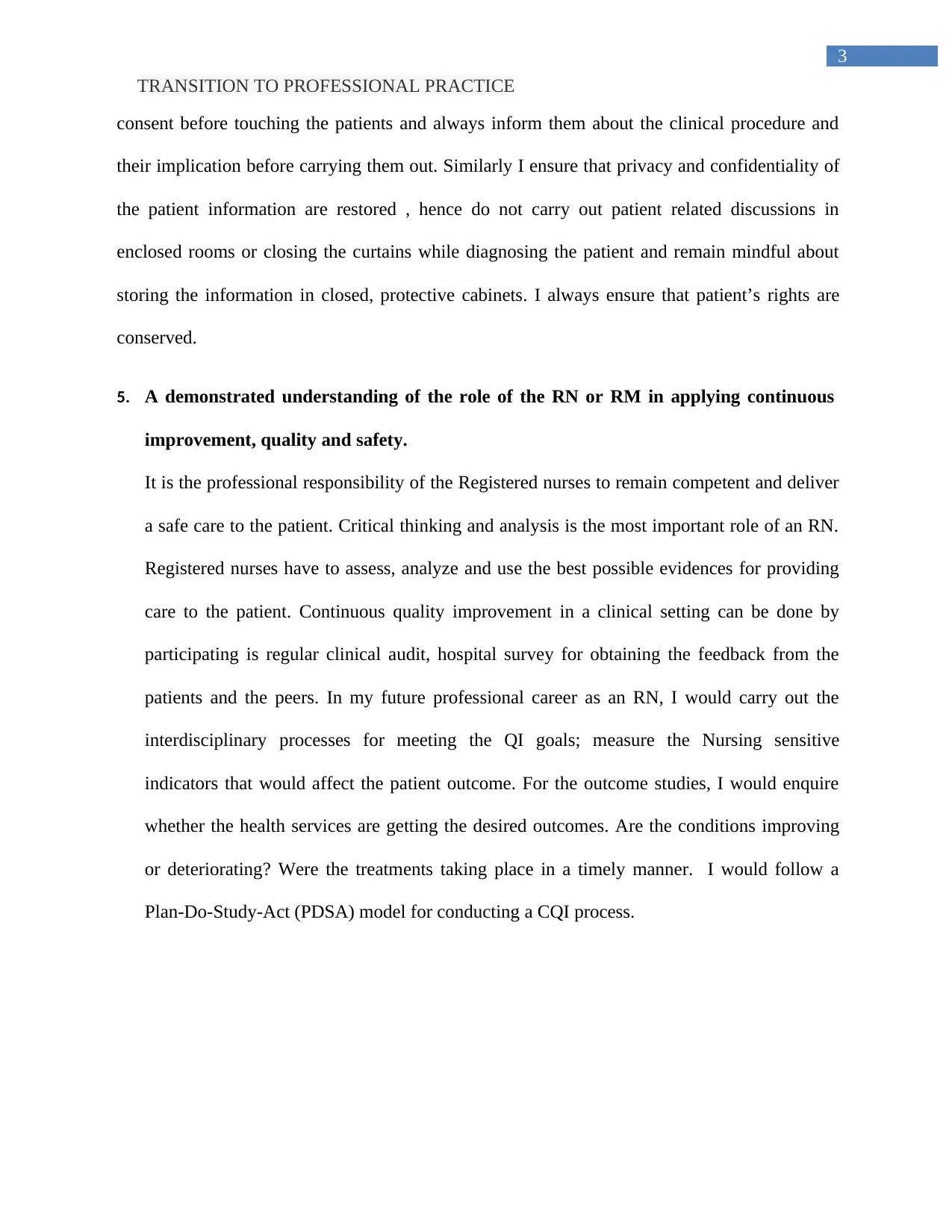
3
TRANSITION TO PROFESSIONAL PRACTICE
consent before touching the patients and always inform them about the clinical procedure and
their implication before carrying them out. Similarly I ensure that privacy and confidentiality of
the patient information are restored , hence do not carry out patient related discussions in
enclosed rooms or closing the curtains while diagnosing the patient and remain mindful about
storing the information in closed, protective cabinets. I always ensure that patient’s rights are
conserved.
5. A demonstrated understanding of the role of the RN or RM in applying continuous
improvement, quality and safety.
It is the professional responsibility of the Registered nurses to remain competent and deliver
a safe care to the patient. Critical thinking and analysis is the most important role of an RN.
Registered nurses have to assess, analyze and use the best possible evidences for providing
care to the patient. Continuous quality improvement in a clinical setting can be done by
participating is regular clinical audit, hospital survey for obtaining the feedback from the
patients and the peers. In my future professional career as an RN, I would carry out the
interdisciplinary processes for meeting the QI goals; measure the Nursing sensitive
indicators that would affect the patient outcome. For the outcome studies, I would enquire
whether the health services are getting the desired outcomes. Are the conditions improving
or deteriorating? Were the treatments taking place in a timely manner. I would follow a
Plan-Do-Study-Act (PDSA) model for conducting a CQI process.
TRANSITION TO PROFESSIONAL PRACTICE
consent before touching the patients and always inform them about the clinical procedure and
their implication before carrying them out. Similarly I ensure that privacy and confidentiality of
the patient information are restored , hence do not carry out patient related discussions in
enclosed rooms or closing the curtains while diagnosing the patient and remain mindful about
storing the information in closed, protective cabinets. I always ensure that patient’s rights are
conserved.
5. A demonstrated understanding of the role of the RN or RM in applying continuous
improvement, quality and safety.
It is the professional responsibility of the Registered nurses to remain competent and deliver
a safe care to the patient. Critical thinking and analysis is the most important role of an RN.
Registered nurses have to assess, analyze and use the best possible evidences for providing
care to the patient. Continuous quality improvement in a clinical setting can be done by
participating is regular clinical audit, hospital survey for obtaining the feedback from the
patients and the peers. In my future professional career as an RN, I would carry out the
interdisciplinary processes for meeting the QI goals; measure the Nursing sensitive
indicators that would affect the patient outcome. For the outcome studies, I would enquire
whether the health services are getting the desired outcomes. Are the conditions improving
or deteriorating? Were the treatments taking place in a timely manner. I would follow a
Plan-Do-Study-Act (PDSA) model for conducting a CQI process.
Paraphrase This Document
Need a fresh take? Get an instant paraphrase of this document with our AI Paraphraser
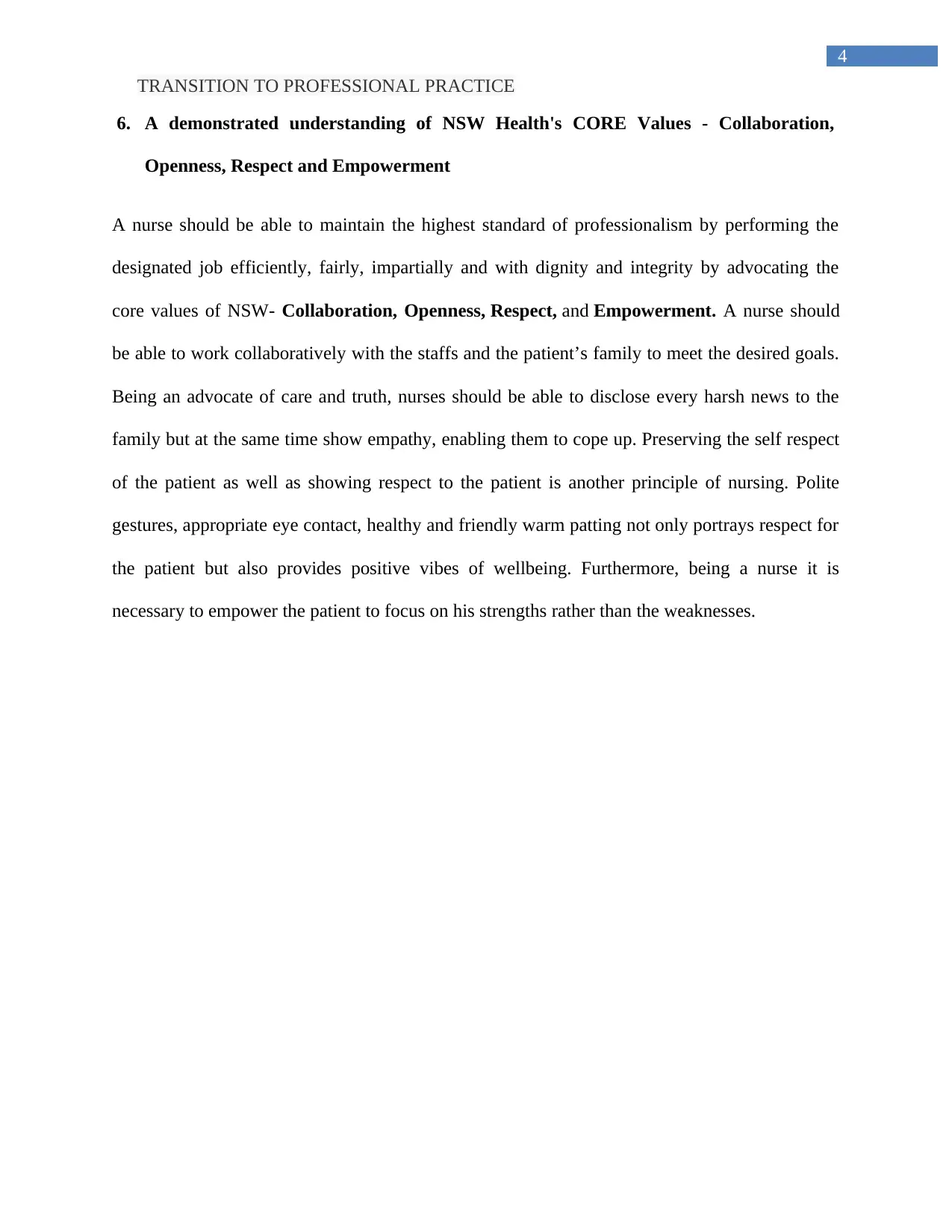
4
TRANSITION TO PROFESSIONAL PRACTICE
6. A demonstrated understanding of NSW Health's CORE Values - Collaboration,
Openness, Respect and Empowerment
A nurse should be able to maintain the highest standard of professionalism by performing the
designated job efficiently, fairly, impartially and with dignity and integrity by advocating the
core values of NSW- Collaboration, Openness, Respect, and Empowerment. A nurse should
be able to work collaboratively with the staffs and the patient’s family to meet the desired goals.
Being an advocate of care and truth, nurses should be able to disclose every harsh news to the
family but at the same time show empathy, enabling them to cope up. Preserving the self respect
of the patient as well as showing respect to the patient is another principle of nursing. Polite
gestures, appropriate eye contact, healthy and friendly warm patting not only portrays respect for
the patient but also provides positive vibes of wellbeing. Furthermore, being a nurse it is
necessary to empower the patient to focus on his strengths rather than the weaknesses.
TRANSITION TO PROFESSIONAL PRACTICE
6. A demonstrated understanding of NSW Health's CORE Values - Collaboration,
Openness, Respect and Empowerment
A nurse should be able to maintain the highest standard of professionalism by performing the
designated job efficiently, fairly, impartially and with dignity and integrity by advocating the
core values of NSW- Collaboration, Openness, Respect, and Empowerment. A nurse should
be able to work collaboratively with the staffs and the patient’s family to meet the desired goals.
Being an advocate of care and truth, nurses should be able to disclose every harsh news to the
family but at the same time show empathy, enabling them to cope up. Preserving the self respect
of the patient as well as showing respect to the patient is another principle of nursing. Polite
gestures, appropriate eye contact, healthy and friendly warm patting not only portrays respect for
the patient but also provides positive vibes of wellbeing. Furthermore, being a nurse it is
necessary to empower the patient to focus on his strengths rather than the weaknesses.
1 out of 5
Related Documents
Your All-in-One AI-Powered Toolkit for Academic Success.
+13062052269
info@desklib.com
Available 24*7 on WhatsApp / Email
![[object Object]](/_next/static/media/star-bottom.7253800d.svg)
Unlock your academic potential
Copyright © 2020–2026 A2Z Services. All Rights Reserved. Developed and managed by ZUCOL.



![Nursing Personal Statement for University Application - [Year]](/_next/image/?url=https%3A%2F%2Fdesklib.com%2Fmedia%2Fimages%2Ffs%2F8b9dc1d7da2e42a582d59123880456ac.jpg&w=256&q=75)

